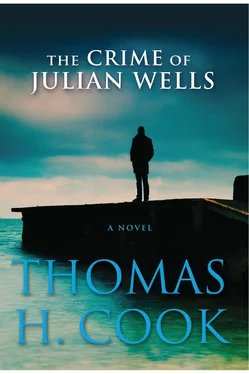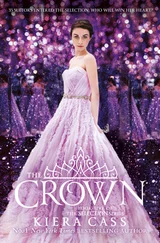Thomas Cook - The Crime of Julian Wells
Здесь есть возможность читать онлайн «Thomas Cook - The Crime of Julian Wells» весь текст электронной книги совершенно бесплатно (целиком полную версию без сокращений). В некоторых случаях можно слушать аудио, скачать через торрент в формате fb2 и присутствует краткое содержание. Год выпуска: 2012, ISBN: 2012, Издательство: Grove Press, Жанр: Криминальный детектив, на английском языке. Описание произведения, (предисловие) а так же отзывы посетителей доступны на портале библиотеки ЛибКат.
- Название:The Crime of Julian Wells
- Автор:
- Издательство:Grove Press
- Жанр:
- Год:2012
- ISBN:9780802194589
- Рейтинг книги:5 / 5. Голосов: 1
-
Избранное:Добавить в избранное
- Отзывы:
-
Ваша оценка:
- 100
- 1
- 2
- 3
- 4
- 5
The Crime of Julian Wells: краткое содержание, описание и аннотация
Предлагаем к чтению аннотацию, описание, краткое содержание или предисловие (зависит от того, что написал сам автор книги «The Crime of Julian Wells»). Если вы не нашли необходимую информацию о книге — напишите в комментариях, мы постараемся отыскать её.
The Crime of Julian Wells — читать онлайн бесплатно полную книгу (весь текст) целиком
Ниже представлен текст книги, разбитый по страницам. Система сохранения места последней прочитанной страницы, позволяет с удобством читать онлайн бесплатно книгу «The Crime of Julian Wells», без необходимости каждый раз заново искать на чём Вы остановились. Поставьте закладку, и сможете в любой момент перейти на страницу, на которой закончили чтение.
Интервал:
Закладка:
Julian would have been waiting for something else.
But what?
On the heels of that question, a strange anxiety swept down upon me, and as if from a great height, I saw Julian lean over the side of the boat and make those two horrible motions, and then a circle of blood sweep out from the boat, deep and red, flowing out and widening until the whole pond was a deep, thick, impene shy;trable red.
Loretta’s voice suddenly brought me back.
“I have something for you,” she said, then reached into her pocket, drew out a photograph, and handed it to me. “It was in Julian’s notebook. The one I gave him the morning he died. I found this picture tucked inside, so I think he must have been thinking of that first trip.”
In the photograph Julian and Marisol were posed before the Obelisk, a place we’d often used as a point of rendezvous. It was around noon, the sun directly overhead so that it hardly cast a shadow. Marisol stood to Julian’s left, and he’d put his arm around her waist and was gently drawing her toward him.
“You took that picture, didn’t you, Philip?” Loretta asked.
“Yes,” I answered. “It was our last day together.” I stared at the picture a moment longer, then looked at Loretta.
“How very odd,” she said. “Julian had the same expression on his face as the one you just had.”
“What expression?”
“Dread,” Loretta answered. “We were having dinner three days before he died. I’d been editing a book on Soviet espionage. There was an agent with the code name Beaker, quite a clever agent. He was a double agent, actually, working for one side while pretending to work for the other. Beaker was a very gifted little actor, but at one point, when he is sitting with another agent, he knows this other agent is trying to determine if Beaker, himself, is a spy. So Beaker is trying very hard to appear completely nonchalant, give no hint that he even knows that this other guy is out to get him. In the past he has always been able to completely conceal his terror of being discovered, but this time, his nerves give way. . and he turns the corner of napkin. It’s a tiny little movement, but it’s a nervous movement, and at that moment Beaker knows absolutely that the other guy has seen it, and has read it for what it is.” She smiled, but cheerlessly. “It was as if a tiny bead of sweat had just popped onto his brow, but it was enough for the other man to see the jumpy little spy beneath the mask.”
“It’s almost comic,” I said.
“I thought so, too,” Loretta said. “But it wasn’t comic to Julian. I could tell by the look on his face. His mind was going somewhere. And one thing was clear. He understood Beaker. I could see that. He understood how his nerves had cracked. He didn’t talk for a second or two, then he said, ‘When your life is a lie, the truth has high stakes.’”
We watched each other silently for a moment, a time during which a dark cord seemed to draw us closer to each other.
“One more thing,” she said. “Another little anecdote. Then you’ll have all I have to give you about Julian.”
She appeared somewhat reluctant to tell me the story.
“The day before he died, he went into the sunroom after dinner,” she said. “There was a notebook on the little table beside his chair. I saw him take it up and write something in it. Then he put it back down and after a while he dozed off. When I went in to wake him, I saw what he’d written. A single sentence, but I remember it because it was so strange.”
Briefly she seemed captured in that very strangeness.
“He’d written, ‘Life is, at last, a Saturn Turn.’”
I had no idea what this meant, and told her so.
“I have no idea either,” Loretta said. “But it must have meant something to Julian, because after his death, when I found that little notebook, I saw that he’d torn out that page. I couldn’t find it anywhere, and it was summer, so there was no fire. I looked in all the places he might have tried to discard or hide it. I never found it, so there was only one place he could have put it.”
“The pond,” I said.
She nodded. “Hiding that note was his penultimate act.”
“And it was an act of subterfuge,” I added. “Of concealment.” I felt the soft click of a tumbler. “One of his themes.”
Now the dread that had earlier marked Julian’s face, and more recently my own, settled upon Loretta’s features, too.
“Julian once told me about a myth he’d come across,” she said. “It came from the Pacific Islands. It was called the ‘Myth of the Reeds.’ It says that at death, the soul of each man is bound by his hidden crimes, each one wrapped around him like a reed. And it is only as these crimes are solved that he is freed.” She let this settle in before she added, “I sometimes thought that Julian was tangled up in a reed.”
“And died that way?” I asked.
“Unless that’s what he was cutting,” Loretta said. “Metaphorically, at least.”
I could find nothing illuminating to add to this, and so we talked of other things until the hour came, and we set off for the airport.
Evening was beginning to drift down over the city by then, lights coming on, both in the buildings and in the traffic. The time had come for me to leave.
At the airport, I pulled my luggage from the back of the car.
“When will you be back?” Loretta asked.
“I haven’t booked the return yet,” I answered.
“Does that feel good?” Loretta asked.
“I suppose it does, but at the same time I know that I’m a little at sea in all this,” I admitted. “Let’s face it, I was never trained in finding anything but metaphors and symbols.”
She smiled. “Julian used to say that you find more when you don’t know what you’re looking for.”
I felt a wave of admiration for my lost friend, the random riches of his work. Harry had often complained that he could not be categorized. Was he writing about crime or was he writing about history? Did you put him in “General Nonfiction” or did you put him in “True Crime”? His books had been strewn with little nuggets of everything: history, science, philosophy, a vast number of quotations, all of which made it nearly impossible for booksellers to find a slot on the shelf. I’d even found his books tucked hopelessly in “Travel” and even once in “Vampires.”
“He found a great deal,” I said.
“And so will you, Philip,” Loretta assured me.
I thought of all the many years during which she had accumulated her own great store of knowledge and experience, all she had read and all she had endured, a bounty I found myself wanting to share.
“I hope so,” I told her, “because I think something very important depends upon it.”
“What?” she asked.
“Us,” I answered softly, and knew that in some inexpressible way this was true.
Loretta came forward and kissed me on the cheek. “Julian could not have had a better friend,” she said.
10
But Julian had had perhaps as good a friend in Rene Brossard.
They’d met in Africa, when Julian was researching the Paul Voulet outrages, and had subsequently traveled together to some of the remote outposts where those atrocities had been committed. According to Julian, Brossard had a lingering aura of old crimes, though the nature of those crimes had never been revealed. Even so, there was a hint of violence both suffered and inflicted, Brossard’s one of those lives that had both struck and received a blow.
I’d met him in Julian’s company a few times, though he’d made certain to remain in the background on those occasions. Whether this had been the product of Gallic manners or simply that he was slow to warm to strangers had never been clear. Of course, it might equally have been the outward evidence of some inner furtiveness, for there was surely something veiled about Brossard.
Читать дальшеИнтервал:
Закладка:
Похожие книги на «The Crime of Julian Wells»
Представляем Вашему вниманию похожие книги на «The Crime of Julian Wells» списком для выбора. Мы отобрали схожую по названию и смыслу литературу в надежде предоставить читателям больше вариантов отыскать новые, интересные, ещё непрочитанные произведения.
Обсуждение, отзывы о книге «The Crime of Julian Wells» и просто собственные мнения читателей. Оставьте ваши комментарии, напишите, что Вы думаете о произведении, его смысле или главных героях. Укажите что конкретно понравилось, а что нет, и почему Вы так считаете.












